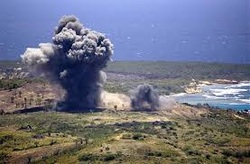
In the latest report, a US agency denies complaints that their army drills would be responsible for illness on the Puerto Rican island of Vieques. The US Navy used the island between 1941 and 2003 to practice firing rockets, missiles and bombs. Many of the self-governing island's 10,000 residents claimed 62 years of being subjected to the drills caused serious damage to human health and to the environment.
The report dismissed the islanders' health as generally poor, stating that increased mortality rates could be partially due to a lack of access to medical care. A solution springs to my mind. The navy could donate and fund a medical facility to the island as a parting gift after years of self-interested use.
The Agency for Toxic Substances and Disease Registry said there was no credible scientific evidence to link cancers, asthma and other illnesses to the military activities. They admitted that other tests needed to be done to detect the cumulative impact of exposures to chemicals. A munitions clean-up is ongoing and is expected to take at least another 20 years.
What about sound? Noise from the constant firing of rockets missiles and bombs could affect the resident's health. The effect of sound is an expanding area of research.

The use of sound is even being applied to white goods. Companies are looking into the hum fridges make, as a certain tone could make people think their food is fresher.
I'm reading an exciting novel at the moment about the way music affects the brain. The characters are taken into a state of ecstasy by certain mathematical sound vibrations, and are oblivious to the harm caused to their body. I look forward to finishing Connected by Simon Denman.
There is always an opposite or opposing force. Sound can benefit or harm a human brain. The plight of the innocent islanders should evoke sympathy from us all. I'm in no position to help financially, but I'll generate empathetic thoughts in the hope of a solution.
The sea complains upon a thousand shores. Alexander Smith

 RSS Feed
RSS Feed






